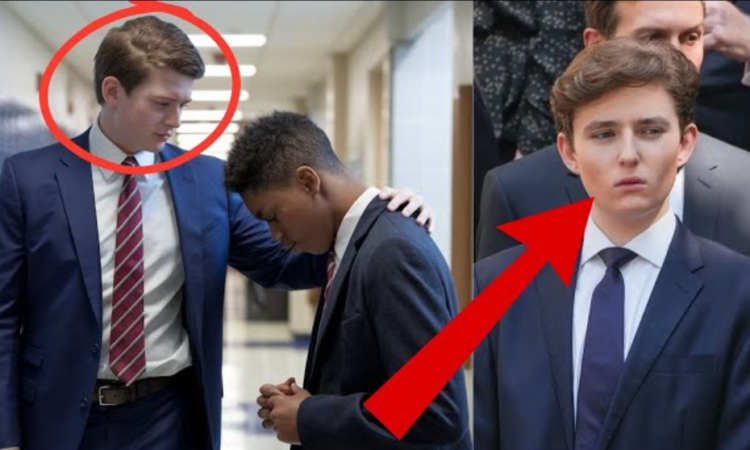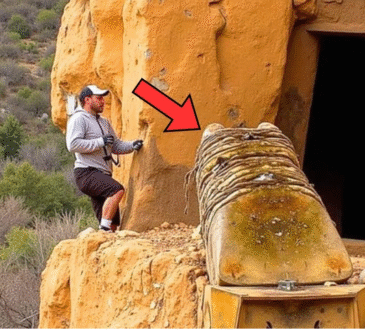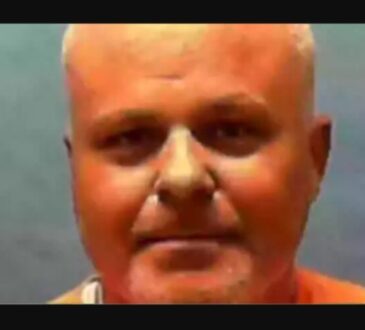
What happens when the son of a former president witnesses injustice in the one place every kid expects to feel safe—school? This is the untold story of Barron Trump, a reserved teenager who stood against prejudice, sparked change, and found himself in a moment that even his father couldn’t ignore.
The bell rang sharply, echoing through the pristine halls of Wellington Academy, a private school renowned for its ivy-covered buildings, manicured lawns, and elite student body. Among the crowd was Barron Trump, adjusting the strap of his leather backpack as he moved through the sea of students. Despite his tall, lanky frame and unmistakable connection to his famous father, Barron cherished his relative anonymity.
As he approached his locker, a sharp laugh caught his attention. At the end of the hallway, Alex, a ringleader known for his cutting remarks, leaned against the lockers. His target was Jamal, a wiry boy with deep brown skin and intelligent eyes. Clutching his books tightly, Jamal stood silent as Alex and his followers hurled thinly veiled jabs.
Barron’s jaw tightened. The cruelty didn’t leave physical bruises, but the words were sharp enough to cut. Jamal caught Barron’s gaze briefly, a flicker of unspoken plea or resignation in his eyes. The bell rang again, dispersing the group, but the unease lingered in Barron’s chest.
Later that day, in Mrs. Holloway’s classroom, Barron found himself grouped with both Jamal and Alex for a civil rights project. The tension was palpable as they gathered at a table.
“Civil rights, huh?” Alex sneered, smirking at Jamal. “Bet you’ve got some personal stories to share.”
“That’s enough,” Barron interrupted, his voice firm.
Alex raised an eyebrow. “Relax, Trump. No need to get all high and mighty.”
Word of the confrontation spread quickly. By the next day, Barron felt the shift in the air. A threatening note was left in his locker: Watch yourself, Trump. You’re on the wrong side.
That evening, Barron confided in his father.
“What do you do when people push back, even when you’re trying to do the right thing?” Barron asked over dinner.
Donald Trump leaned back in his chair. “You keep pushing back harder,” he said. “Doing the right thing isn’t always popular, but it’s what separates leaders from followers.”
“But what if it makes things worse?”
Trump’s expression softened. “Sometimes it will. But you’re not responsible for other people’s bad behavior. If you’re doing the right thing, you’re already ahead of most people.”
The next day, Barron approached Jamal in the library.
“Hey,” he said, sliding into the seat across from him. “Mind if I join you?”
Jamal hesitated but nodded. Their conversation was initially awkward, but soon they discovered shared interests, like basketball. By the end of lunch, Jamal was smiling, and Barron felt a sense of purpose.
As they worked on their project, their bond deepened. Their presentation highlighted unsung heroes of the civil rights movement and connected their struggles to modern-day issues. On presentation day, the classroom erupted into applause. Even Mrs. Holloway looked impressed, while Alex sat in sullen silence.
That evening, Barron shared the day’s events with his father.
“I’m proud of you, son,” Trump said. “You didn’t just do the work; you made a statement. That’s what leadership is about.”
In the weeks that followed, the school took steps to address underlying tensions, organizing workshops on inclusion and respect. Subtle but meaningful changes began to take root.
Barron and Jamal’s friendship became a testament to the power of standing together. The whispers and rumors about Barron never fully disappeared, but he no longer cared. He had learned that doing the right thing was worth the risk and that courage, once found, had a way of growing.
Barron Trump had stepped out of the shadow of his last name, proving that quiet strength and integrity could make a lasting impact—even in the face of adversity.




